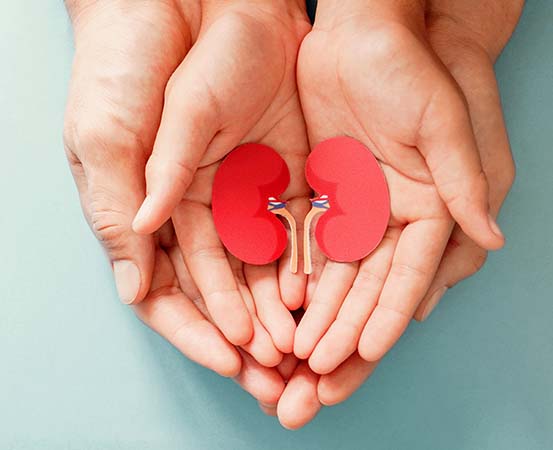
During his early childhood years, Nikhil (name changed), a little boy from Bangalore, didn’t prefer to run or walk and would sit even while playing. Apart from having stunted growth (in terms of height and weight), he also experienced repeated urinary tract infections. Multiple medical examinations revealed that Nikhil had progressive kidney failure when he was 10 years old.
According to doctors, kidney diseases are not uncommon in children, and parents should not ignore repeated episodes of urinary infections in them. “Most often, frequent urinary infections in children are a sign of kidney disease or a structural defect in the kidney,” warns Dr Saumil Gaur, consultant pediatrician and pediatric nephrologist, Rainbow Children’s Hospital, Marathahalli, Bangalore, who treated the boy. While Nikhil’s parents attributed his repeated urine infections to public toilets, Dr Gaur says it is one of the most common myths. “Public toilets need not always be the source of a urinary tract infection. If ignored and left untreated, the infection can weaken the bones in some cases. In Nikhil’s case, progressive kidney failure was due to a delayed diagnosis,” he says.
Kidney diseases in children
Urinary tract infections, nephrotic syndrome (presence of excessive protein in the urine) and weak kidneys are the most common kidney diseases in children, points out Dr Gaur. A 2022 study conducted by researchers in the US points out that chronic kidney disease (CKD) is one of the growing health concerns among children.
Dr Vishwanath S, HOD & consultant – nephrology and transplant physician, Manipal Hospital, Old Airport Road, Bangalore, adds that posterior urethral valve obstruction (a congenital condition that affects the normal flow of urine), polycystic and multicystic kidney disease (puss-filled cysts in the kidneys) and fetal hydronephrosis (swelling in one or both kidneys) comprise the other renal abnormalities.
Posterior urethral valve obstruction specifically affects boys, says Dr Ashiq Raval, director, urology and kidney transplant, Nanavati Max Super Speciality Hospital, Mumbai. “The condition is characterized by an abnormal growth of flaps of tissue in the urethra, which affects the kidneys and bladder movements,” he explains.
Kidney diseases in children: When can they be detected?
Certain renal issues, such as hydronephrosis, polycystic or multicystic kidney disease, abnormal renal rotation (rotated kidneys) and renal agenesis (absence of one or both kidneys), are birth defects. Children with such complications will have pronounced structural defects that can be detected during the prenatal testing phase or intrauterine phase. On the contrary, issues like urine infections, weak kidneys and nephrotic syndrome can develop after birth, describes Dr Gaur. “Most structural defects and urinary tract infections will start manifesting from the time of birth. However, nephrotic syndrome is typically seen during the developing years (1.5 to 10 years old),” he adds.
Early signs of kidney disease in children
Parents must not ignore certain signs in their children, as they could be early indicators of a renal infection, cautions Dr Gaur. The signs include:
- Puffiness of the eyes and body
- Pain while passing urine.
- Sudden increase in urination frequency
- Blood in urine
- High blood pressure
- Stunted height
- Excess body weight
- Weak or bent bones
- High-grade fever (in some cases)
Diagnosis and treatment
Although most renal issues are not life-threatening, early diagnosis is crucial. The tests for diagnosis vary depending on the symptoms, says Dr Gaur. Blood tests, urine tests and a renal ultrasound are some of the common procedures for identifying issues with the kidney. In addition, genetic testing during the intrauterine stages helps diagnose the specific condition present in the child.
Dr Vishwanath explains, “Some inherent conditions, such as a non-functioning kidney, a kidney in an unusual location or cysts in the kidneys, are not completely curable. However, they are not life-threatening as long as the kidneys carry out the function of waste excretion from the body.”
However, developmental abnormalities like posterior urethral valve obstruction can be corrected if detected shortly after birth. “One can opt for endoscopic valve ablation or vesicostomy – a minimally invasive surgery for removing the obstructive tissue – to create an alternative route for bladder functions,” explains Dr Raval. Early detection can prevent kidney failure. Due to a delayed diagnosis, Nikhil has to undergo kidney transplant surgery and is currently waiting for a donor.
Preventive measures
Inherited kidney disorders result from genetic mutations and, hence, cannot be prevented. However, the lifestyle choices of parents before and during conception can play a part in determining their severity, informs Dr Raval.
Dr Gaur strongly advises against controlling the urge to urinate, saying that children should be encouraged to drink plenty of fluids throughout the day and use the washroom whenever there is a need. Blood pressure should be regularly checked for children with frequent urination and genetic anomalies to prevent hypertension-induced kidney complications.
Parents can also train their children to maintain hygiene and use sanitizers while using community toilets to ensure safety. In addition, those with inherited renal dysfunctions should follow a kidney-friendly diet based on the specific complication.
Parents who are prone to kidney complications can help prevent or reduce the severity of the same in their child through a healthy lifestyle, a balanced diet, regular exercise and avoiding exposure to toxins before conception, advises Dr Raval, emphasizing the need for pregnancy planning and prenatal counseling to avoid complications.
Takeaways
- According to experts, kidney diseases can affect children, and parents should address the situation if their children experience repeated episodes of urinary infections.
- Early signs of renal issues in children include pain while urinating, frequent urination, excess body weight and blood in the urine.
- Early detection of renal complications can help prevent kidney failure.
- Lifestyle choices of parents, which include exercising regularly, following a balanced diet and avoiding toxin exposure, can help prevent or reduce the severity of kidney complications in their child.

















